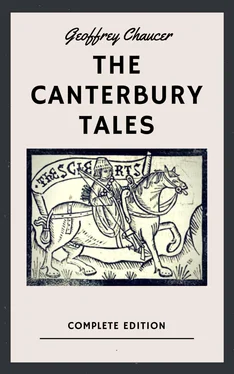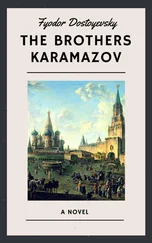They saide that it were a charity
That Theseus would *enhance his degree*, *elevate him in rank*
And put him in some worshipful service,
There as he might his virtue exercise.
And thus within a while his name sprung
Both of his deedes, and of his good tongue,
That Theseus hath taken him so near,
That of his chamber he hath made him squire,
And gave him gold to maintain his degree;
And eke men brought him out of his country
From year to year full privily his rent.
But honestly and slyly* he it spent, *discreetly, prudently
That no man wonder'd how that he it had.
And three year in this wise his life be lad*, *led
And bare him so in peace and eke in werre*, *war
There was no man that Theseus had so derre*. *dear
And in this blisse leave I now Arcite,
And speak I will of Palamon a lite*. *little
In darkness horrible, and strong prison,
This seven year hath sitten Palamon,
Forpined*, what for love, and for distress. *pined, wasted away
Who feeleth double sorrow and heaviness
But Palamon? that love distraineth* so, *afflicts
That wood* out of his wits he went for woe, *mad
And eke thereto he is a prisonere
Perpetual, not only for a year.
Who coulde rhyme in English properly
His martyrdom? forsooth*, it is not I; *truly
Therefore I pass as lightly as I may.
It fell that in the seventh year, in May
The thirde night (as olde bookes sayn,
That all this story tellen more plain),
Were it by a venture or destiny
(As when a thing is shapen* it shall be), *settled, decreed
That soon after the midnight, Palamon
By helping of a friend brake his prison,
And fled the city fast as he might go,
For he had given drink his gaoler so
Of a clary <25>, made of a certain wine,
With *narcotise and opie* of Thebes fine, *narcotics and opium*
That all the night, though that men would him shake,
The gaoler slept, he mighte not awake:
And thus he fled as fast as ever he may.
The night was short, and *faste by the day *close at hand was
That needes cast he must himself to hide*. the day during which
And to a grove faste there beside he must cast about, or contrive,
With dreadful foot then stalked Palamon. to conceal himself.*
For shortly this was his opinion,
That in the grove he would him hide all day,
And in the night then would he take his way
To Thebes-ward, his friendes for to pray
On Theseus to help him to warray*. *make war <26>
And shortly either he would lose his life,
Or winnen Emily unto his wife.
This is th' effect, and his intention plain.
Now will I turn to Arcita again,
That little wist how nighe was his care,
Till that Fortune had brought him in the snare.
The busy lark, the messenger of day,
Saluteth in her song the morning gray;
And fiery Phoebus riseth up so bright,
That all the orient laugheth at the sight,
And with his streames* drieth in the greves** *rays **groves
The silver droppes, hanging on the leaves;
And Arcite, that is in the court royal
With Theseus, his squier principal,
Is ris'n, and looketh on the merry day.
And for to do his observance to May,
Remembering the point* of his desire, *object
He on his courser, starting as the fire,
Is ridden to the fieldes him to play,
Out of the court, were it a mile or tway.
And to the grove, of which I have you told,
By a venture his way began to hold,
To make him a garland of the greves*, *groves
Were it of woodbine, or of hawthorn leaves,
And loud he sang against the sun so sheen*. *shining bright
"O May, with all thy flowers and thy green,
Right welcome be thou, faire freshe May,
I hope that I some green here getten may."
And from his courser*, with a lusty heart, *horse
Into the grove full hastily he start,
And in a path he roamed up and down,
There as by aventure this Palamon
Was in a bush, that no man might him see,
For sore afeard of his death was he.
Nothing ne knew he that it was Arcite;
God wot he would have *trowed it full lite*. *full little believed it*
But sooth is said, gone since full many years,
The field hath eyen*, and the wood hath ears, *eyes
It is full fair a man *to bear him even*, *to be on his guard*
For all day meeten men at *unset steven*. *unexpected time <27>
Full little wot Arcite of his fellaw,
That was so nigh to hearken of his saw*, *saying, speech
For in the bush he sitteth now full still.
When that Arcite had roamed all his fill,
And *sungen all the roundel* lustily, *sang the roundelay*<28>
Into a study he fell suddenly,
As do those lovers in their *quainte gears*, *odd fashions*
Now in the crop*, and now down in the breres**, <29> *tree-top
Now up, now down, as bucket in a well. **briars
Right as the Friday, soothly for to tell,
Now shineth it, and now it raineth fast,
Right so can geary* Venus overcast *changeful
The heartes of her folk, right as her day
Is gearful*, right so changeth she array. *changeful
Seldom is Friday all the weeke like.
When Arcite had y-sung, he gan to sike*, *sigh
And sat him down withouten any more:
"Alas!" quoth he, "the day that I was bore!
How longe, Juno, through thy cruelty
Wilt thou warrayen* Thebes the city? *torment
Alas! y-brought is to confusion
The blood royal of Cadm' and Amphion:
Of Cadmus, which that was the firste man,
That Thebes built, or first the town began,
And of the city first was crowned king.
Of his lineage am I, and his offspring
By very line, as of the stock royal;
And now I am *so caitiff and so thrall*, *wretched and enslaved*
That he that is my mortal enemy,
I serve him as his squier poorely.
And yet doth Juno me well more shame,
For I dare not beknow* mine owen name, *acknowledge <30>
But there as I was wont to hight Arcite,
Now hight I Philostrate, not worth a mite.
Alas! thou fell Mars, and alas! Juno,
Thus hath your ire our lineage all fordo* *undone, ruined
Save only me, and wretched Palamon,
That Theseus martyreth in prison.
And over all this, to slay me utterly,
Love hath his fiery dart so brenningly* *burningly
Y-sticked through my true careful heart,
That shapen was my death erst than my shert. <31>
Ye slay me with your eyen, Emily;
Ye be the cause wherefore that I die.
Of all the remnant of mine other care
Ne set I not the *mountance of a tare*, *value of a straw*
So that I could do aught to your pleasance."
And with that word he fell down in a trance
A longe time; and afterward upstart
This Palamon, that thought thorough his heart
He felt a cold sword suddenly to glide:
For ire he quoke*, no longer would he hide. *quaked
And when that he had heard Arcite's tale,
As he were wood*, with face dead and pale, *mad
He start him up out of the bushes thick,
And said: "False Arcita, false traitor wick'*, *wicked
Now art thou hent*, that lov'st my lady so, *caught
For whom that I have all this pain and woe,
And art my blood, and to my counsel sworn,
As I full oft have told thee herebeforn,
And hast bejaped* here Duke Theseus, *deceived, imposed upon
And falsely changed hast thy name thus;
I will be dead, or elles thou shalt die.
Thou shalt not love my lady Emily,
But I will love her only and no mo';
For I am Palamon thy mortal foe.
And though I have no weapon in this place,
Читать дальше












